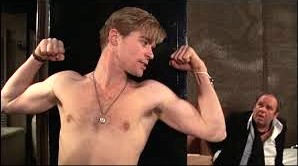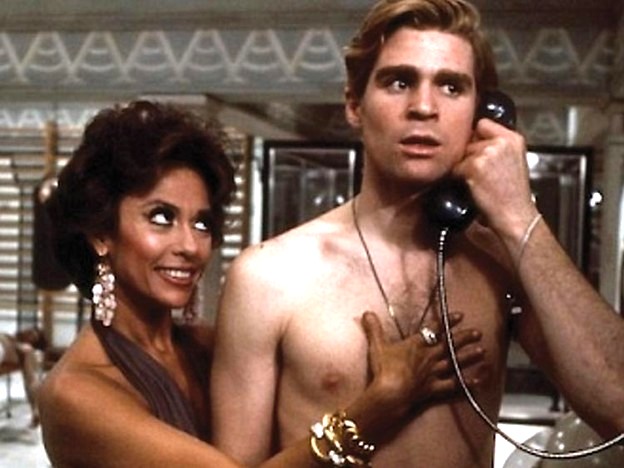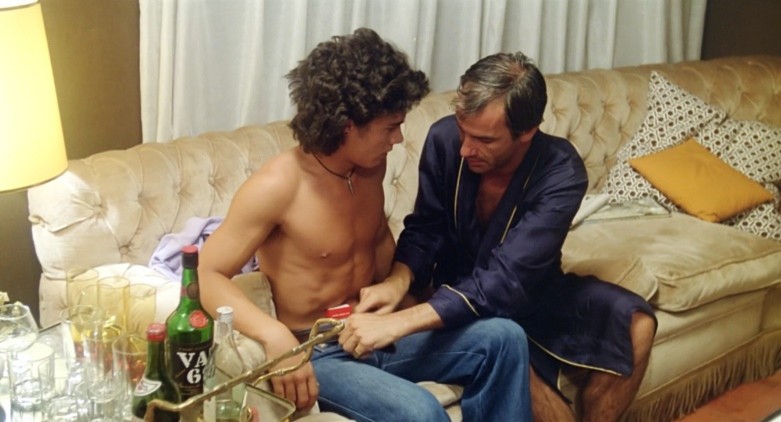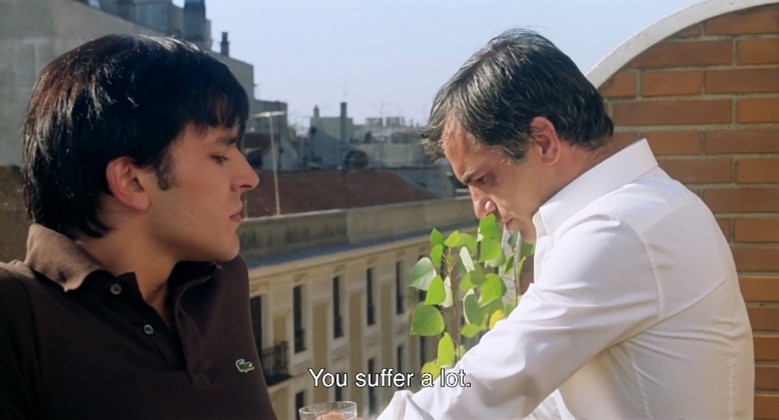a farce with notes
by Douglas Messerli
Terence McNally
(screenplay, based on his play), Richard Lester (director) The Ritz /
1976
Yet what to do about a work that treats everything and everyone with which and whom it comes in contact like a vaudeville stereotype—including homosexuals, gay baths, gay bath patrons, Italians, Puerto Rican women, overweight men, men who are attracted to and chase (“chubby chasers”) overweight men, Jews, transvestites, muscle-men, detectives, men with high voices, heterosexuals, theater producers, go-go boys, and the city of Cleveland.
Furthermore, although the film features
some of the best comedians imaginable—Jack Weston, Kaye Ballard, and Jerry
Stiller for starters—except for Treat Williams, the go-go boys Tiger and Duff
played by John Everson and Christopher J. Brown, and Rita Moreno(1) the movie,
most strangely since it supposedly occurs in a gay bathhouse filled with men
determined to visually attract the members of their own sex, is stuffed with
some of the least attractive actors to post their faces, bellies, and butts
upon the silver screen. Perhaps the fact that the three major comedians are
portraying heterosexuals might comically explain that fact except that the Ritz
Baths seem also to be a major attraction to the least attractive men in town,
including other excellent thespians like F. Murray Abraham and Paul B. Price.
Moreno, playing the washed-up would-be
musical actress Goggie Gomez, moreover, speaks Spanglish as if she had studied
with the Spanish-born guitarist and former wife of Xavier Cugat, Charo; and
Williams playing Detective Michael Brick inexplicably speaks like a squeaky
voiced Baby June (“my body developed but my voice didn’t develop with it”),
renders them both quite sexless, particularly since Moreno is mistaken for a
transvestite, while detective Williams is totally improbable as a “dick.” In
short, for a hidden retreat of forbidden lust and queer passion, The Ritz is
without a sexual groan stirring in the house.
With this film’s director Richard
Lester(2) at the helm it might have been wonderful to see what chaos the
Beatles, playing the four straight intruders, might have imposed upon this gay
haven—I can just imagine Ringo playing the discombobulated singer Googie with a
Scouse accent; George subbing for Weston’s character, Gaetano Proclo, the
Beatle dubbed as “the quiet one” forced to switch type to become a loud and
rambunctious interloper; John playing the Mafia-involved Garbage King Carmine
Vespucci, the Jerry Stiller figure who has put out Proclo’s death warrant; with
Paul playing the high-voiced pretty boy Brick; and I am sure Brian Epstein
might have been more than happy to take over Murray’s role as Chris,
desperately seeking sexual contact with anyone is this god-forsaken den of
inequity(3); isn’t this perhaps something like what playwright Joe Orton
imagined for his script of a third Beatle’s flick?(4)
You get the idea. The only way I can even
talk about McNally and Lester’s work is in terms the farce it desires to
become. Surely, the playwright originally imagined his work to be a
Feydeau-like sex romp with people spinning in and out of beds, hiding,
sometimes en masse under them, and mistaking everyone for someone else
of which they were either desirous or terrified.
To clue you in to what has to be an
utterly convoluted plot, because of his increasing mafia business dealings
Carmine Vespucci (Stiller), on orders from his dying father, has ordered his
brother-in-law, Gaetano Proclo (Weston) to be murdered because of his unknowing
interference with the family’s plans. In an attempt to escape the contract on
his life, Proclo jumps into the first taxi he can hail, demanding to be taken
somewhere where he can never be found. It just happens that the taxi is owned
by Vespucci and family and the driver has been told to take Proclo to the Ritz,
a gay bathhouse.(5) This is where first time detective Michael Brick comes in
or is supposed to have been already been waiting to be discovered with Proclo
in his bed by Vespucci so that, it stands to reason in heterosexual heaven, the
man could not be blamed for killing a brother-in-law found in the arms of a gay
man.
In between and amidst this hither and
thither racing up and down floors, in and out of rooms (including the notorious
steam room), Googie performs her hilariously malapropic and maladroit Broadway
musical numbers(7); Chris calls out for love, at one point shouting that Joe
Namath is in “room number----,” his own room obviously(8), which proves to
Proclo that this truly is not a gay bath; and Claude decides to enter the
talent contest, demanding that Proclo and Chris join him in a lip-sync
performance of a song by The Andrews Sisters, a contest which they indisputably
win!
Too bad Proclo is such a dim wit that it
took him what seems like half of the movie to realize that not only has he
mistakenly chosen to hide out in a gay bath, but that the shocking things he
can’t believe he’s encountering are all actually quite fun.
By film’s end the real Vespucci and Proclo’s wife Vivian (Ballard) have joined the frolics at The Ritz, eventually unraveling the yarn of absurd events, with Vivian, realizing how her brother has tricked her husband into a false instance of in flagrante delicto threatening to reveal how Vespucci has raked off the profits of a local bingo game if he doesn’t cancel the contract for Proclo’s life. Even if no one will admit it, all seemed to have learned that life is a bit more exciting at The Ritz than in New Jersey or Cleveland to which the straight folks are sentenced to return.
The “siren-voiced”(8) Brick gets the girl, the goofy Googie after he reveals that he has an uncle who is a theater producer, and off they go down the yellow brick road of utter perdition without knowing that it was Brick’s uncle who fired Googie from all of her previous musical gigs.
notes
(1) Just because of her
role of Anita in the film version of West Side Story Moreno will always
remain beautiful to me.
(2) In case you were
born after the Beatles two movies, you may not know that Richard Lester was the
director of both
A Hard Day's Night (1964) and Help! (1965).
(3) In Christopher
Münch’s film The Hours and the Times (1991), the director hints that
Brian Epstein, the gay manager of the Beatles, who traveled with John Lennon to
Barcelona on holiday in 1963, may have engaged or attempted to engage Lennon in
sex. See my review above.
(4) In
1967 English playwright Joe Orton was asked to write a script for The Beatles’
third film. by then Orton had become a celebrated playwright in the London
theatre. The Beatles’ manager Brian Epstein thought he might be the perfect
writer for a Beatles film, and Paul McCartney had previously invested £1,000 in
Orton’s other play Loot.
The resulting script was titled Up Against It.
Orton met with Shenson and began writing the script. He also met McCartney and
Epstein on the day before Christmas, and a contract was drawn up, which allowed
Orton to buy back the script rights if it were rejected. Orton delivered an
initial draft in February. He expected it to be rejected, which it was, noting
in his diary that “the boys, in my script, have been caught in-flagrante,
become involved in dubious political activity, dressed as women, committed
murder, been put in prison and committed adultery.” This script is referenced
in Stephen Frear’s film on Orton Prick up Your Ears (1987). See my
review above.
(5) Any upstanding gay
boy in New York in the 1960s and 1970s knew that nearly all the gay bars and
clubs were Mafia owned.
(6) Richard Lester
directed the film version of Stephen Sondheim A Funny Thing Happened on the
Way to the Forum (1966), starring Zero Mostel, Jack Gilford, and Phil
Silvers, with a cameo appearance by Buster Keaton.
(7) Among Googie’s
numbers is a song from West Side Story. You can imagine what she does to
her Cole Porter songs she sings.
(8) As a card-carrying
gay boy in New You in 1969, I was told by many friends that Namath was a
regular patron of gay establishments such as Julius’ and other such bars.
(9) By putting this
phrase in quotations I am suggesting that my statement is ironic, the opposite
of what it seems to be saying. Such linguistic usages are often used in gay
camp talk.
Los Angeles, December
14, 2020
Reprinted from My
Queer Cinema blog and World Cinema Review (December 2020).















